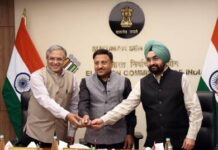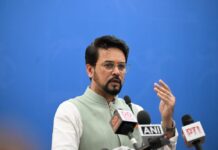Chandigarh September 19, 2023
To live together as a united society is also a Yajna : Prof. Sudhir Kumar Arya
Department of Sanskrit, Panjab University conducted two lectures titled ‘Dayanand Saraswati Ki Vedarth Paddhati’ and ‘Vedadhyayan Ki Dishayen’ today on 19.9.23. The lectures were held under Swami Dayanand Saraswati’s 200th birth anniversary celebrations. The lectures were given by Prof. Sudhir Kumar Arya from the Jawaharlal Nehru University, New Delhi. Faculty members, research scholars and students of the department and Dayanand Chair for Vedic Studies attended the lectures. Prof. Sudhir Kumar Arya began his lecture by stating the multi-dimensionality of meanings of Vedas. “Unlike the non-Vedic literature like the works of Kalidasa and others, the Vedic mantras can have many meanings depending on the context”, said Prof. Arya. Telling about the proper manner in which Vedas should be understood, he said, “Maharshi Dayanand Saraswati strictly stated that to understand Vedas one has to first learn Vedangas like Shiksha, Vyakarana, Nirukta and so forth.” Prof. Arya gave a few illustrations from the Vedas for the audience. He said, “in the first mantra of the Rigveda, the word Agni does not simply mean fire, but it stands for any person or natural phenomenon which leads us to growth and prosperity.” “Similarly the concept of Yajna in an expanded one, where not just putting oblations in fire, but even working and living together as a united society is also a Yajna by definition”, said Prof. Arya.
Academic incharge of the Sanskrit department Prof. V. K. Alankar gave a vote of thanks. He spoke about studying various commentaries on Vedas to understand their meaning. He said, “it is necessary that one should perform a comparative study of the various commentaries of the Vedas, critically analyse them and choose the best possible meaning.”














